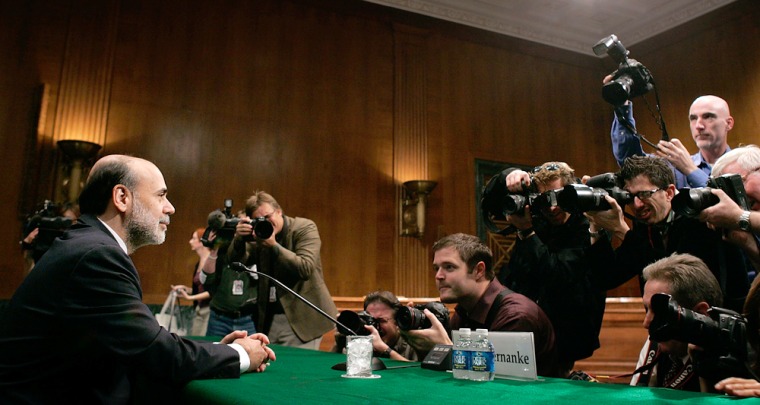Poor Ben Bernanke.
He barely has time to settle into his big leather chair at the Federal Reserve, and there goes former Chairman Alan Greenspan, whispering into the ear of Wall Street high-rollers and sending financial markets into a tizzy.
Nobody is saying precisely what pearls of wisdom Greenspan dropped at a very exclusive dinner for hedge fund investors hosted by Lehman Bros. last week in New York. Rumors of the former chairman’s bullishness were enough to send market interest rates higher — and to draw the ire of some economists and editorialists who felt left out.
Even though Greenspan’s appearance was subject to modest legal restrictions — he was not permitted to disclose anything discussed in his final meeting with Fed policy-makers Jan. 31 —some said Greenspan should observe a longer period of silence to allow Bernanke to establish himself.
"In turning to profitable work immediately after leaving government service Mr. Greenspan is only following standard U.S. practice," noted the Financial Times in an editorial. "However, a retiring Fed chairman is clearly in a far more sensitive position than a retiring agriculture or education secretary."
In any case it probably will take some time for Bernanke to crawl out from under the shadow of his larger-than-life predecessor.
The former Princeton professor begins the process Wednesday, when he heads to Capitol Hill for his first extensive public remarks since taking over as central bank chairman Feb. 1. Expectations are high that the plain-speaking economist will clarify his views on a range of issues, including just how much further the central bank will go in its rate-hike campaign and how quickly he plans to make changes like setting an inflation target that would make monetary policy more transparent.
Expectations might be too high, said Ed McKelvey, senior economist at Goldman Sachs.
“Being new at the job, Chairman Bernanke is apt to proceed with caution notwithstanding his strong credentials for the job and his prior service on the board,” McKelvey said in a research note. “Better to err on the side of saying too little rather than too much, as more can always be said later.”
Members of the House and Senate will give Bernanke every opportunity to test his new megaphone in two days of testimony on the Fed’s semi-annual economic outlook.
“There is going to be a dance between him and the congressmen,” said Ethan Harris, chief U.S. economist for Lehman Bros. “They’re going to try to get him to talk about all kinds of tangential issues. It will be interesting to see where he draws the line.”
The betting is that Bernanke will keep his opinions a bit more tightly guarded than Greenspan, who in the latter part of his 18-year tenure felt free to expound on issues well beyond the purview of the central bank, including President Bush’s tax proposals and Social Security privatization.
On the main issue before the House and Senate panels, Bernanke is likely to echo the statement approved by Fed policy-makers Jan. 31, when the panel raised benchmark interest rates for the 14th time in 19 months.
Even though he was not involved in the meeting, he probably will back the committee’s assessment that economic expansion remains “solid” and that another rate hike may be needed as growth rebounds from the sluggish 1.1 percent rate posted in the fourth quarter.
Most Wall Street economists and investors have come around to the view that the Fed will raise short-term interest rates another quarter-percentage point at the first meeting of policy-makers to be chaired by Bernanke March 27-28. But with the meeting still six weeks away, the rate hike is contingent on continued evidence that the economy and employment are growing strongly, analysts say.
“(His) point will be that the data will speak,” said Lynn Reaser, chief economist for Bank of America’s investment strategies group “The level of interest rates appears to be reaching the appropriate zone, but the flow of economic numbers will dictate exactly where the Federal Reserve goes from here.”
One key figure to watch will be the February employment report due March 3. The latest report from the Bureau of Labor Statistics showed the unemployment rate fell last month to 4.7 percent, its lowest level in five years. But the economy added only 193,000 jobs, fewer than expected, and some analysts said even that figure was boosted by unusually warm weather.
At the same time Bernanke and other central bankers can be expected to keep a close eye on signs that the housing market is slowing, like the recently lowered business forecast from luxury homebuilder Toll Bros.
Still Harris, for one, believes a rate hike March 28 is just about a sure bet.
“I’d be very surprised if they don’t hike at the March meeting,” Harris said. “(Bernanke) is inheriting an economy that looks in good shape. Financial markets look in good shape. There are some risks on the inflation front, but the current numbers look good. And then he’s got a credibility issue. Does he really want to start his chairmanship by going on hold after 14 straight hikes? I don’t think there should be any uncertainty.”
